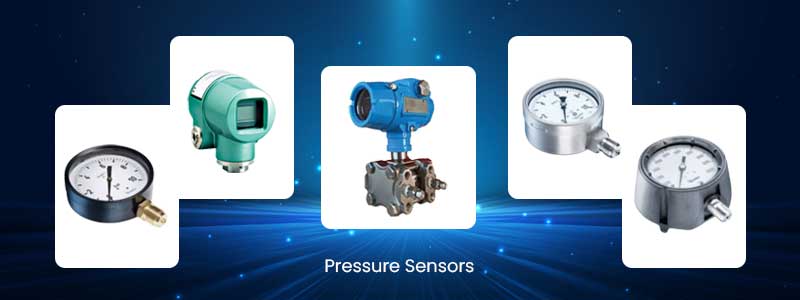
You may have heard about pressure sensors but not fully appreciated their critical role in everyday industrial applications. These measurement devices are used in many industries, such as automotive, HVAC, food and beverage, etc. Their fundamental role is monitoring and controlling processes involving gases and liquids to ensure safety and efficiency. This blog will clearly define pressure sensors and how they work. We will also review the different pressure sensor types and their applications so that you will gain a deeper understanding of them by the end of this blog. Let’s get started!
Pressure Sensors and Their Working
As per their name (pressure sensors), you may get them simple, but they encompass diverse technologies and are essential for measuring the force applied over the area. Let’s understand their working principle:
- A pressure sensor takes the force from something pushing it, such as air or water. Then, it changes that force into an electrical signal, which a computer or a machine can read. There are various types of pressure sensors, and each works differently.
- For example, some sensors change their electrical resistance when pressure is applied, while some change depending on how much electricity they can use. There are also some sensors that use magnets to detect the pressure.
Types of Pressure Sensors
Different industries use distinct pressure sensors, but what type will be ideal for your industrial needs? To learn that, you must go through the common types to decide which sensor best suits your application requirements.
Absolute Pressure Sensors
Absolute pressure sensors are also known as vacuum sensors. They measure pressure relative to zero (perfect vacuum) and provide a reading of the total pressure a gas or liquid uses. They are essential in vacuum monitoring and measuring air pressure in barometer-critical applications.
Differential Pressure Sensors
The next one is the differential pressure sensor, which measures the difference in pressure between two points. These sensors compare two pressures rather than referencing a vacuum or atmospheric pressure. Industrial processes use these sensors to maintain the desired pressure differentials, ensuring safe and efficient operations. The applications include flow measurement, where differential sensors are used to calculate flow rate.
Gauge Pressure Sensors
A gauge pressure sensor is also known as a vented or relative pressure sensor. It measures pressure relative to atmospheric pressure and indicates whether it is above or below the surrounding air pressure. Gauge pressure sensors are used in industrial applications to monitor pressure in hydraulic and pneumatic systems. They are also used to check the fluid levels of a vented tank or the desired rate of a vacuum pump.
Applications of Pressure Sensors
Let’s take a quick look at some industrial applications of pressure sensors:
- Hydraulic or pneumatic systems rely on pressure sensors to function. These sensors ensure proper pressure flow, allowing the systems to work efficiently and smoothly.
- In HVAC systems, pressure sensors play a vital role in monitoring and controlling airflow. This helps maintain consistent temperature and air quality in buildings.
- In factories, pressure sensors measure the pressure difference at two points, indicating how much liquid or gas is moving through a pipe. This helps them calculate the flow rate required to control production.
- Many industrial processes involve the use of filters to clean liquids or gases. Sensors measure the pressure difference across filters. If the pressure difference is too high, the filter is not clean and requires replacement.
- The food and beverage industries use sensors to monitor and control pressure throughout processing and packaging. This ensures that the final product meets safety and quality standards.
Wrapping Up
So, you now may be familiar with how crucial pressure sensors are in different industrial applications. Given their significance, if you’re also considering buying a reliable pressure sensor, Davis Control Limited proudly invites you to explore its selection. We offer various sensors to meet your applications’ diverse needs. Our knowledgeable staff is always available to guide you in navigating the options and ensuring you find the appropriate sensor. From absolute to differential, gauge, and more, our sensors are designed to offer reliable and accurate measurements.
Contact us today or request a quote to learn more!

